
Activity Report 2021
The annual chronicle of the activities of the
Vera & Donald Blinken Open Society Archives

The annual chronicle of the activities of the
Vera & Donald Blinken Open Society Archives
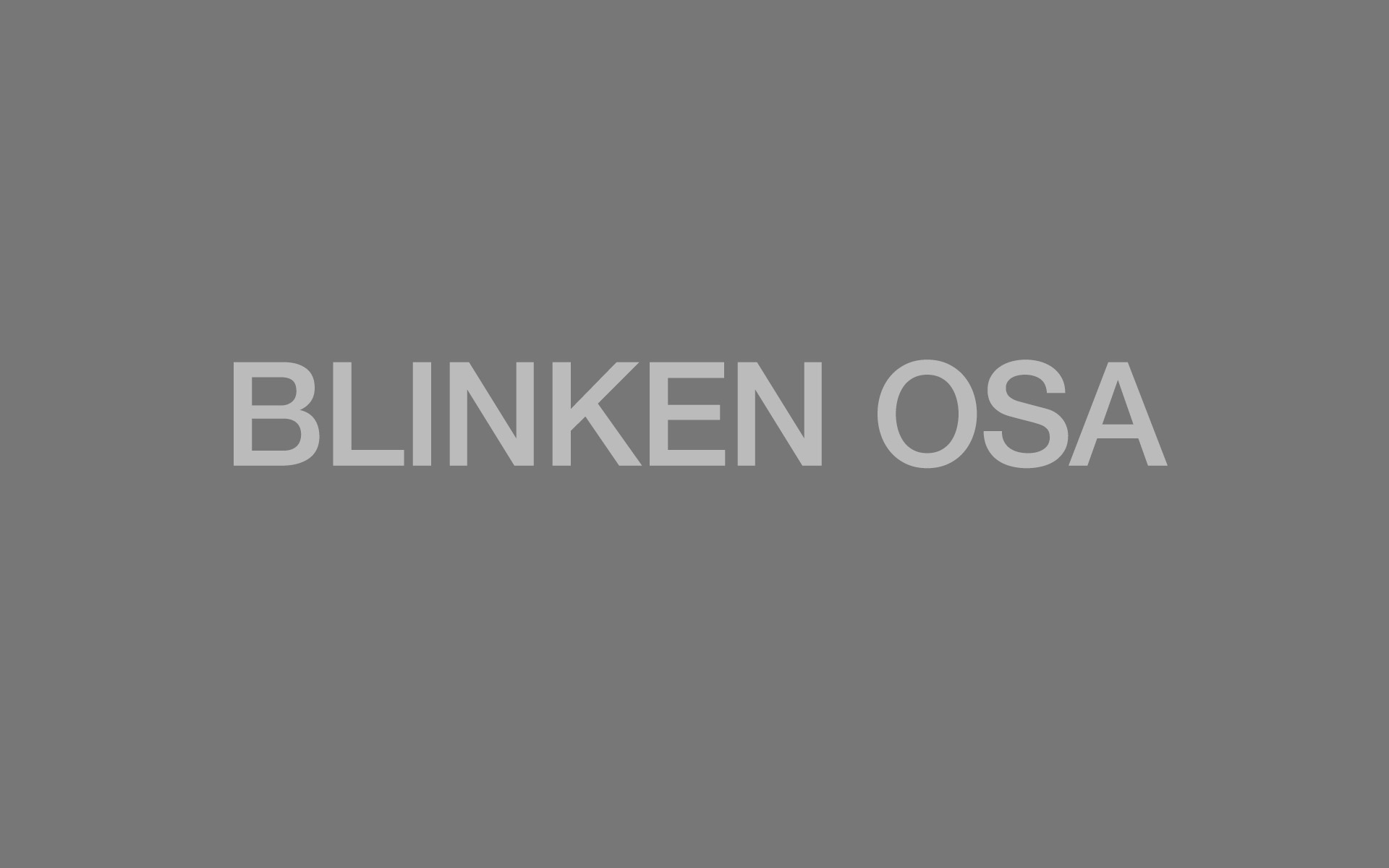
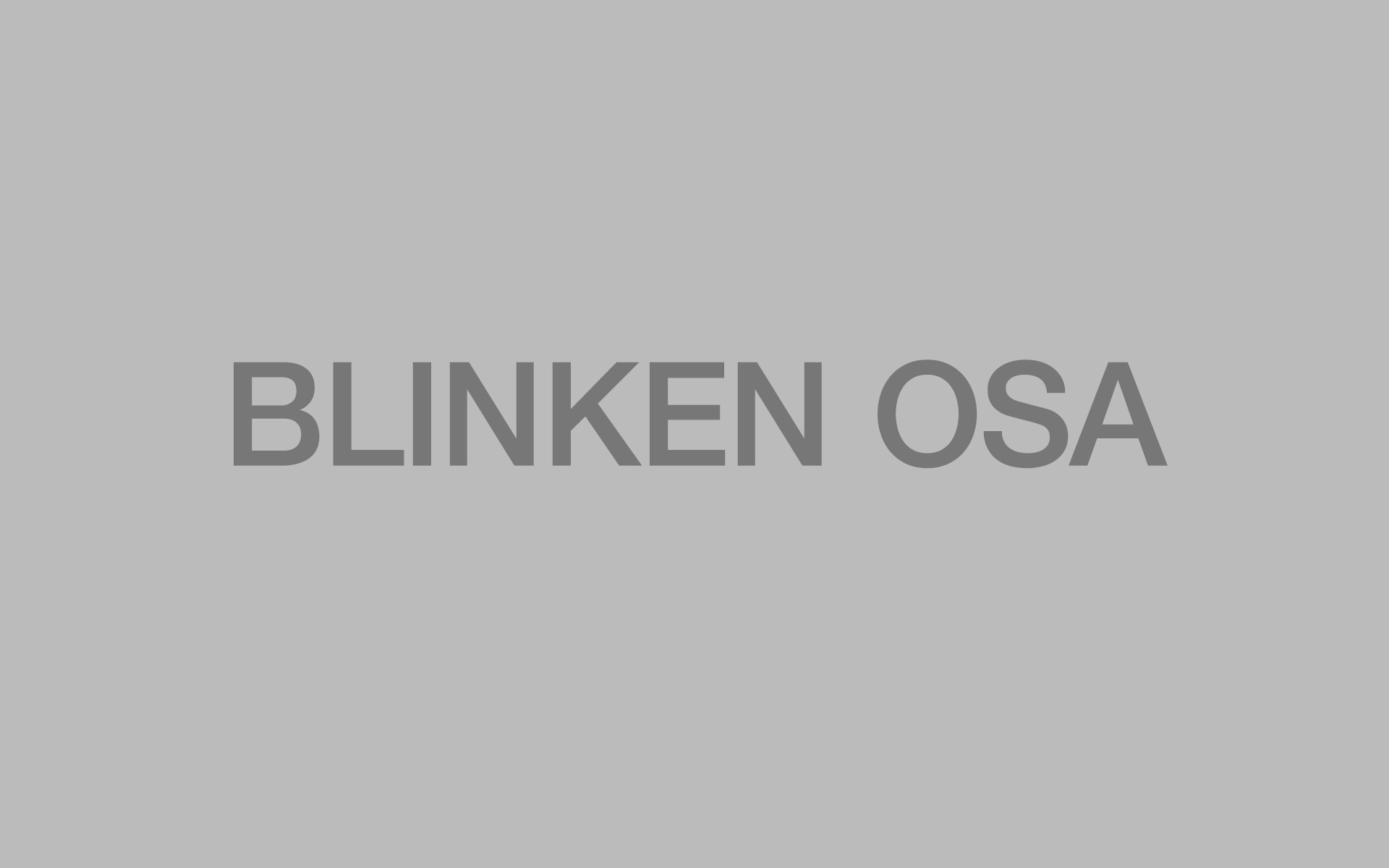
István Rév
Difficult years, in this part of the world, do not pass but multiply. 2021 was the second year of the pandemic, with Hungary having the fourth highest per capita Covid-related mortality in the world. Public institutions, especially public collections, had to remain closed for long periods of the year. Blinken OSA Archivum – while making use of all available safety measures – tried to go on serving the public: during low tides of the pandemic, the archive was open for researchers, who could reserve seats in the research room in advance. There was no summer recess in 2021; the research room remained open during the summer months when the virus retreated for a while, providing a window of opportunity in-between subsequent waves.
At the beginning of the year the Archives embarked on an unprecedented digitization program: with an extremely ambitious five-year plan, we hope to provide digital copies of our most important and most in-demand documents to the public by the end of 2025. The move of CEU to Vienna, and to the world online, has lent both importance and urgency to this program. The pandemic showed us that we should prepare for unexpected, unforeseeable extended periods when researchers are not able to work with analogue material on the premises of the Archive. Students are less and less familiar with working with printed material and less willing to do so; they prefer instantly available digitized and tagged documents, instead of searching in the archival catalogue and finding aids. In the past year we had about 300 thousand pages digitized, while we continued digitizing our close to 14,000-hour audio-visual collections, over 60% of which have already been digitized. One of our colleagues donated 10 million forints to develop a mobile application for the “Parallel Archive” platform that allows researchers to build virtual digital archives from the documents they find and photograph in archives. (www.parallelarchive.org)
The pandemic did not prevent the Hungarian government (and other governments – in Poland and Russia, among others – from continuing the cultural war against the residues of sanity. Historical revisionism remains one of the primary battlefields of the war on culture. In 2001, Blinken OSA finished a five-year teachers’ training program on the history of the twentieth century in East-Central Europe. This was the only accredited non-official teachers’ training program in Hungary. As a result of further intensification of the officially promoted historical revisionism, we have no hope of renewing the accreditation. We will produce an online version based on the five-year experience with high-school teachers, and plan to start a new, this time, unaccredited training program for teachers.
Despite the disruption of normal (academic) life, the Archive continued and expanded its teaching activities. Together with the Tokyo University of Foreign Studies, Universidade Nova in Lisbon, the University of Florence, and INALCO in Paris, CEU started a “History in the Public Sphere” program as part of the Erasmus Mundus program of the European Union. History in the Public Sphere is a two-year MA program that focuses on the ways the past is represented, contested, and negotiated in the public sphere, exploring various contexts from the early modern period to the present in a comparative and transnational way. Blinken OSA is an important part of the program, in the frame of which students attend a seminar on archival practice and theory, besides spending a month of intensive internship in the Archive in Budapest. CEU faculty members, who, at the same time work in the Archive, continued to offer their classes to the CEU students in Vienna. 2021 was the first year when the Archive designed and hosted a class specifically designed for students of privatized, formerly public Hungarian universities, where academic freedom became severely restricted because of political control over higher education in the country. The topic of the first such course was the notion and practice of parrhesia, the Greek notion of fearless speech. As part of the CEU Summer University program, the Archive organized and hosted an advanced summer program on “Confronting the Crisis of Expertise. Historical Roots and Current Challenges” with the participation of experts in diverse fields, coming from different countries.
As a “Weapon to Fight Denialism”, the Archive Collecting Evidence on the Srebrenica Genocide; The Srebrenica Memorial Center Archive was opened in 2021, in order to provide local access to evidentiary documents on the genocide. Blinken OSA supported the creation of the new archive in Bosnia–Herzegovina with pro bono consultancy work, training the archivists and donating important relevant archival documents related to the Srebrenica massacre. OSA houses the documentary collection of the Srebrenica mass grave exhumation by the Boston based human rights organization, Physicians for Human Rights.
In collaboration with 444.hu, the most popular news portal among the few remaining independent news outlets in Hungary, OSA has started a regular blogpost on historical events with current relevance, based on archival sources from the OSA collections. The Archive continued its collaboration with the “Off-Biennale”, an independent curatorial collective that tries to keep alive free and publicly relevant artistic expression under an autocratic regime, the enemy of experimentation in art and culture. This was the third edition of OFF-Biennale Budapest with the collaboration of Blinken OSA, entitled INHALE! That took the political poem “A Breath of Air!” by 20th-century Hungarian poet Attila József as its starting point. Today, when surveillance is taking on global proportions, social inequalities are greater than ever, there is a new peril: beneath the looming shadow of the climate catastrophe, inhaling fresh air has become the privilege of a select few.
István Rév


Robert Parnica
Although 2021 had an unprecedented effect on our lives and work, nobody could have imagined that in March 2020 the same situation would persist in March 2021 with even more devastating consequences for both life and society. Our faith in science and medical progress, especially in vaccines, proved to be exaggerated and over-optimistic, and our expectation that the pandemic would end by summer 2021, proved to be another severe disappointment. Still, we all hoped and believed that the pandemic and all that went with it (restrictions, social distancing, inoculation, etc.) would soon be behind us. Now, in 2022, we are still in the pandemic although there are good reasons for cautious optimism and hopes that the pandemic soon will be downgraded to epidemic and many restrictions lifted.
| 2020 | 2021 | |
|---|---|---|
| Days Open | 119 | 119 |
| New Registered Researchers | 79 | 53 |
| Actual Visits | 113 | 70 |
| Total Visits | 380 | 376 |
| Per Day | 3.1 | 3.1 |
| Average Time | 03:53 | 05:06 |
| Number of Requests | 278 | 359 |
| Per Day | 2.3 | 3 |
The operation of the research room in the two pandemic years 2020 and 2021, had some predictable similarities and interesting divergences. Each year the research room was open for the same number of days (119) providing limited services in compliance with the strict observance of pandemic and hygienic measures. The number of visits reached almost identical figures: 380 for 2020 and 376 for 2021. The same is true of the average number of visitors per day, 3.1, for both years. However, there is an important discrepancy in the time spent in the research room. While in 2020, average time spent per researcher in the research room was 03:53 hours, in 2021 this rose to 05:06 hours. This discrepancy can be explained by the fact that on average researchers stayed longer in 2021 than in 2020, even beyond their scheduled time.
There is a slight aberration concerning the number of newly registered researchers. While in 2020 this number was 79, it fell to 53 in 2021. Among those newly registered we observe that they visited the research room on 113 occasions, while in 2021, 53 new researchers visited research room on 70 occasions. This is a sharp drop of 40 visits from the previous year. The reason for this could be explained by the fact that fewer researchers came in 2021 but they spent longer periods in more thorough and dedicated research. This can be also proved by the increased number of researchers' requests per day. While in 2020 there were 278 requests or 2.7 on average per day, in 2021 this number increased to 359 or 3 requests on average per day. These figures, too, illustrate the intensity of archival research under the Covid measures and limited access to archives due to restricted travel.
| 2020 | 2021 | |
|---|---|---|
| CEU Alumni | 1 | 3 |
| Faculty/Staff from CEU | 1 | 1 |
| CEU Students | 11 | 7 |
| Faculty/Staff from Abroad | 2 | 4 |
| Faculty/Staff from Hungary | 9 | 2 |
| Professionals from Abroad | 7 | 12 |
| Professionals from Hungary | 13 | 20 |
| Students from Abroad | 14 | 12 |
| Students from Hungary | 33 | 6 |
| n/a | 2 | 3 |
As already mentioned, 2021 confirmed the trend fewer less researchers visited OSA. Primarily we see a drop in number of CEU students from 11 in 2020 to 7 in 2021. There is a more remarkable drop in the number of the Hungarian students: from 33 in 2020 to only 6 in 2021. The number of faculty from Hungary felt from 9 in 2020 to only 2 in 2021. However, the numbers of the Hungarian and foreign professionals grew from 13 in 2020 to 20 in 2021 and from 7 in 2020 to 12 in 2021, respectively. The number of CEU faculty is still exceptionally low – only 1 for each consecutive year.
Number of Requests per Individual Researcher
| 0 | 1-10 | 11-30 | 31-50 | 51-100 | 100-over | |
|---|---|---|---|---|---|---|
| 2020 | 29 | 53 | 19 | 6 | 2 | 2 |
| 2021 | 17 | 28 | 14 | 4 | 3 | 2 |
This chart shows that a considerable number of researchers requested official registration but did not make any formal request for archival materials. However, it is likely that they used our digital material available online, or microfilm reader or reference library. Most of the researchers requested up to 10 requests and their number is declining as the number of requests rises. There is a considerable number of researchers with only one request that illustrates the nature of the visit. This type of research related to completing one research task or answering a question that did not require studious and lengthy research. These figures suggest that dedicated researchers would be those with more than 11 requests, while the really passionate researchers would be those with over 50 or even 100 requests.
We continued to limit the number of researchers in the research room to a maximum of five, who had to pre-register their visits - a system introduced in 2020. By limiting researchers to two - two-hour slots, we increased the number of researchers per day from five to ten. This registration system functions very well, and it helped us predict the intensity of visits but also to organize workflow in the storage and preparation of the archival materials.
At the end, it is overly complicated to analyze and compare non-pandemic with pandemic years as the starting parameters for this are different and diverge from normality. However, this is a comparison of 2 “pandemic” years with very modest and limited results. In 2021 Blinken OSA did the best it could to improve its services and to mitigate the consequences of the pandemic in academic research. In this disintermediated archival environment, many researchers are relying on digital resources available online, and we can only hope that their number has been growing.
At the beginning of September Reference Services took advantage of the CEU “Orientation week” and planned visit to Quellenstrasse. Unfortunately, due to the worsening pandemic situation in Vienna, we had to cancel our visit and move to an online presentation.
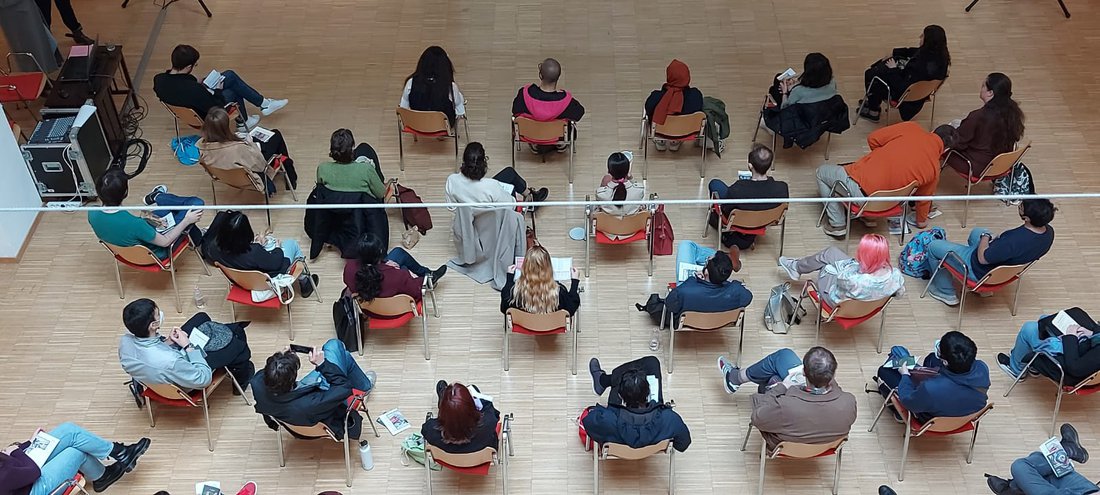
Handicapped by the fact that the CEU community moved to Vienna, Reference Services conducted a series of organizational meetings with CEU departments to increase OSA’s visibility among students and faculty. We invited almost all relevant CEU departments and received positive responses to organize online meetings for the following ones: History, Nationalism, Social Anthropology, Gender, Political Science, Legal, and Environmental Study Departments. Originally, we planned to meet students and professors in person but again, we had to cancel visits and to stick to online presentations. Some of the meetings were well attended with more than 20 students (Legal, Political Study, History), while the others saw much smaller numbers around 6-7 students or even fewer (Environment). We noted that more students came from the departments which take a more active role in preparation and organization. Besides those held exclusively online, there were hybrid meetings when some students were in their classroom while the others were scattered around the globe (Political Science).
Besides reaching out to the CEU community, we also gave professional presentations for foreign students and staff from Columbia University and University of London, and took part in workshops promoting OSA’s digital collections.


Katalin Gádoros
In 2021 Blinken OSA’s core budget, about1.7 % of the total budget of the Central European University, comfortably covered Blinken OSA’s basic professional operations. For the past 15 years this budget has been complemented with an annual grant of $237,000 from the Open Society Foundations (OSF), against appropriate application and on condition of regular reporting. These two financial pillars make it possible for Blinken OSA to implement all its records management and archival activities relating to both the Open Society Foundations network and the Central European University campuses in Budapest and Vienna, its extensive processing and digitization operations, and its mission-related public programs for students and researchers as well as for the general public.
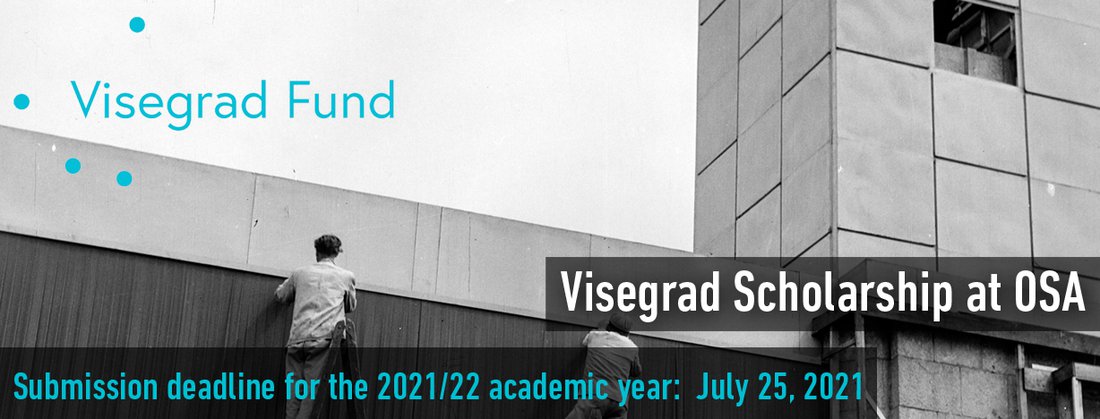
The Visegrad Scholarship at OSA grant scheme started in 2010, bringing in EUR 34,500 for OSA annually, out of which 15 full grants of 2,000 EUR each are awarded each year Grants for shorter periods are pro-rated.
In the years between 2010 and 2021 two hundred and three grants have been awarded with applications arriving from over 50 countries across all five continents. The list of the most researched topics and the publications of Visegrad Scholarship at OSA Fellows between 2010 and 2021 based on their research in the Blinken OSA collections is available at http://www.osaarchivum.org/work-with-us/fellowship/visegrad-scholarship/VisegradScholarship at OSA in numbers
Due to pandemic-related delay Blinken OSA could only complete its educational project for non-Budapest-based secondary school students focusing on the anniversary of the regime change in 1989 from the award for an extended one-year support from the Embassy of the United States of America in 2021, having switched from in-person meetings to online platforms, offering a gamified version of the original curriculum, while it managed to stay within the budget foreseen.
In 2021, just as in the previous year, the global epidemic has strongly defined the operational framework, alternating between face-to-face and online activities, when sudden health restrictions have halted, delayed or diverted planned processes. This was reflected, for example, in unused airline tickets and cancelled accommodation bookings, as well as in face-to-face meetings, conferences being turned into hybrid or online events.
This constant uncertainty has had an impact throughout the year, both on the well-being of colleagues and on the physical and financial framework of the institution
However, in 2021, too, putting all its financial resources to good use OSA managed to cover all its archival and records management tasks and public programs activities, including two major hybrid events, the Methodologies of Working in Cold War Archives. Facts, Values and Archival Ecologies conference and workshop, and the 18th edition of its Verzio international film festival; meanwhile it maintained its overall financial balance throughout the year, ending the fiscal year with a slight underspend due to the postponement of programs because of the pandemic.
2021, like the previous year was marked not only by the uncertainties imposed by the Covid-19 epidemic but also by the changing institutional and academic environment due to the move of the Central European University from Budapest to Vienna. Both put additional strain - emotional as well as practical - on the community of the Blinken OSA. The move to Vienna siphoned off many of the students working in the archive, reduced the number of student and teacher researchers and also disrupted the academic research atmosphere surrounding the archive.
In the new situation, the archive faced new challenges, especially in the area of online education and the online searchability of its collections, having devoted a significant part of its external funding to digitizing its collections and making digitized material available online.
These new objectives had to be implemented with a limited staff, with a vacant chief archivist position and the sabbatical absence of the acting chief archivist.
At the end of 2021 the staff of OSA numbered 43, although this figure fluctuated over the months, as some new colleagues were only contracted for a definite term. Out of the 43 colleagues 9 had fixed term contracts, 1 colleague was on IT payroll, OSA’s core staff counted 34, out of which 27 worked on a full time basis. The full staff of OSA came from 9 countries.
Tasks that the core staff of OSA could not pick up, and which could not be handled by technological development, were covered by externally contracted service providers, externals, interns and CEU students on fixed-term employment contracts. However, the global pandemic and the move of CEU to Vienna have had a powerful impact in this field, too. In 2021 OSA concluded seven short term external contracts, but only five student interns coming from four different countries were working in OSA. Out of these two students came from the CEU, one was a CEU and also a Visegrad Scholarship at OSA alumna, one was an Erasmus exchange student and one came from a Hungarian university.
In order to make all of OSA’s operations transparent and easy to follow OSA circulates the OSA Weekly, a list of events of the week, the monthly Management Meeting Brief (a summary of the Management Meeting) and the monthly Staff Meeting Minutes. The bi-annual Financial Reports, which are followed by the Open Finance Days, where reports and operational invoices are open for the inspection of the staff, also serve the purpose of transparency and open communication.
OSA has a long history in offering different types of fellowships, be these research grants for current Masters and PhD students, individual researchers, exchange stu-dents, artists, journalist or even groups of researchers dedicated to certain research agenda. To date OSA has awarded over 1,300 grants.
Currently OSA offers only three support schemes, out of which the Visegrad Scholar-ship at OSA, awarded jointly with the International Visegrad Fund, supports 15 re-searchers a year for a two-month research period each (for shorter periods the award is pro-rated) and the Aaron Swartz Fellowship supports one successful candidate a year. In 2021 the Aaron Swartz Fellowship was not awarded. The Hoover Archives Research Assistance Scholarship, offered jointly with the Freedom Broadcasting Foundation (formerly the RFE/RL Fund), supporting distant research in the Hoover Archives, was dormant in 2021 for reconstruction works running in the Hoover Archives as well as for the global pandemic restrictions.
The Visegrad Scholarship at OSA scheme, offered jointly with the International Vise-grad Fund, was awarded to 17 Visegrad scholars. Due to the epidemic only 9 scholars could start their research in OSA, all of whom gave their respective university-wide online presentation within the framework of the Visegrad Scholarship at OSA Lecture Series. Seven scholars could not start their research due to the pandemic travel regula-tions, making the number of those “in limbo” sixteen by the end of 2021. The list of successful candidates and their research reports can be accessed under http://www.osaarchivum.org/work-with-us/fellowship/visegrad-scholarship/winnners-and-reserves


Fanni Andristyák
In 2021, due to the pandemic, the education program at Blinken OSA was largely still on hold. At the beginning of the new year, we published the early access version of the computer game that was developed with the help of a grant we received from the United States Embassy in Budapest. The game can be downloaded from the project’s website. Help with the installation and the feedback form for players and teachers are available here. Expert reviews were also commissioned and the game will be further developed based on these as well as feedback received through the website.
On the 12th and 26th of October 2021, Open Society Archives received the Milestone Institute students enrolled in the ’Primary Sources’ module. Milestone Institute Budapest is an educational initiative that aims to familiarize teenagers with interdisciplinary approaches. The ’Primary Sources’ course, coordinated by Adrian Matus, aimed to offer a hands-on approach to history. On 12 October 2021, the session revolved around using the archive as historians. The participants had the opportunity to discover new documents related to the Cold War by referring to the László Cseke’s fond, ’Correspondence to the Teenage Party Broadcast’ (HU OSA 300-40-12). The students had to discover the hidden meanings of the letters sent in the 1970s to Radio Free Europe. Following the micro-history cases, the discussion ended on Cold War history. The second meeting focused on broader topics, such as archival functions and archival typology. Archivist Örs Lehel Tari led the group through the main archival fonds, and discussed the tasks of the archivist, acquisition, and digitalization. The debates revolved around texts written by Michel Duchein (History of modern archives, American Archivists, Vol.55, Winter 1992, 14-26) and ML Caswell (“’The Archive’ Is Not an Archives: On Acknowledging the Intellectual Contributions of Archival Studies”).
In the autumn, the Archives took over the coordination of the Ámbédkár English Tutoring program from CEU’s Community Engagement Office. The project's main goal is to teach English to Roma high school pupils who are studying at the Dr. Ámbédkár High School in Miskolc, to help them with their school-leaving exams and in applying for further studies. Tutoring is provided by volunteers, most of whom are affiliated with CEU. The program was initiated by the Department of Mathematics and supported by Community Engagement Office, Roma Access Program, and HRSI. Besides taking responsibility for coordination, OSA also set out to further develop the program by engaging an expert to design lesson plans for the volunteer tutors. The project team also organized pre-session meetings for the volunteers to enable better preparation before the sessions. The first occasion of the new academic year was held in November 2021 at CEU. Eight students and six volunteers had 3 sessions and a short excursion in the city. Due to the pandemic, the second occasion, held for 12 students in December, had to move online. We hope to continue the program in the coming year with more in-person classes at CEU.


Enikő Gyureskó / Fanni Somlyai
Verzió, a joint project of Blinken OSA Archives and the nonprofit Verzió Film Foundation, continued its activities online in the beginning of 2021, due to the restrictions caused by the COVID-19 pandemic. Verzió partnered with a streaming service provider in the summer of 2020 and after a successful fully online festival edition in November 2020, it continued to offer films online throughout 2021 in the online film library. We concluded the year with the very first hybrid edition of the festival, with both online and onsite events.
The traditional encore screening series, Re:Verzió was held entirely online 15 February through 30 April, 2021. 15 audience favorites and award-winning documentaries from the 17th Verzió International Human Rights Documentary Film Festival were presented on the festival’s website. The proceeds from the ticket sales went to purchasing the rights of I Am Greta, a Swedish documentary about Greta Thunberg, for educational and film club screenings. Re:Verzió 2021 had over 4,500 viewers. In comparison, the 17th Verzió in 2020 had ca. 20,000 online viewers.
In the online film library, named Verziótheque, former festival favorites can be rented throughout the year. The Sundance-winner documentary about the critically acclaimed British singer, Matangi / Maya / M.I.A., was added to the film collection in the spring. The addition of the film was followed by other titles such as Maddy, the Model and Our School, and free access was offered to high school students. Besides the Verziótheque film collection, curated film programs are regularly on offer at festival.verzio.org for shorter periods; many of these are presented in cooperation with other festivals or cultural organizations.
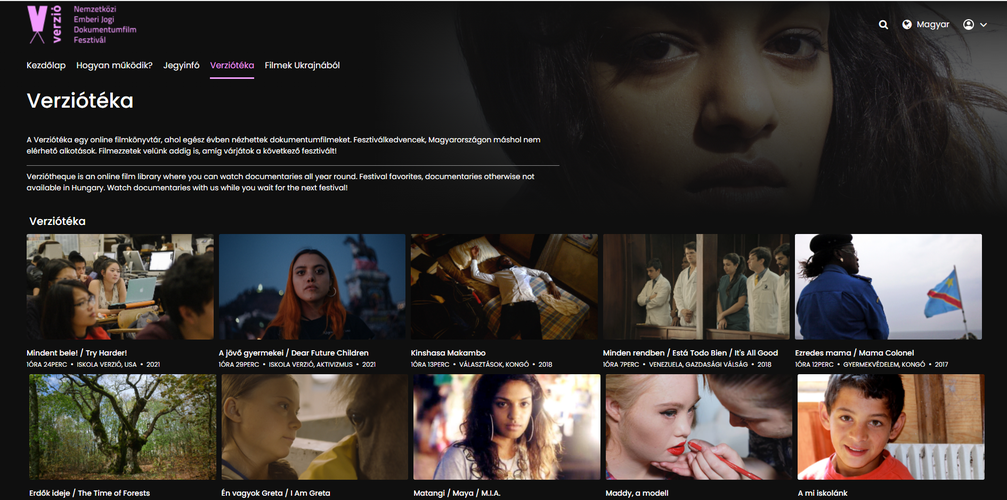
Smog Town was available online for free between May 20-27 2021, in cooperation with OFF-Biennale. The program of the third edition of the OFF-Biennale was inspired by the 1935 poem by the Hungarian poet Attila József, “A Breath of Air!”, the program reflected on the suffocating socio-political climate in many parts of the world and the devastating consequences of climate change. Smog Town follows the staff of Langfang’s environmental bureau while they a fight to eradicate the smog cloud that has enveloped the city year-round. At the intersection of politics, environmental protection, and everyday human interests, they face a number of difficulties. During the Climate Action Week, we offered two green documentaries in cooperation with Szabad Terek, The Time of Forests and I Am Greta. Later on, between 9-16 June, the Young Talents program turned the spotlight on student documentaries: two Polish documentary shorts The Vibrant Village and Sonny, and the Brazilian short film Stunned, I Remain Alert could be rented for free.
Joining the annual Budapest Pride program, we hosted a film screening about LGBTQ+ rights at the Archives. The latest documentary of Hungarian filmmaker Mária Takács, Game On – Queer disruptions in sport were screened on July 7. The screening was followed by a discussion with the director and the two Hungarian protagonists, Csaba Hegedüs and Benjamin Forest Török, and Dr Miklós Fischer sport psychologist. Game On was also available online at the festival’s website during the Pride.
The 18thVerzió International Human Rights Documentary Film Festival was organized between 9-21 November 2021; its slogan was Layers of Reality. While Verzió could at last return to the cinemas, it also maintained its online presence. For the first time in its history, Verzió partnered with the Budapest Municipality during its festival edition. The Municipality was represented in the Jury for the Hungarian Documentary Competition and the City of Budapest also sponsored the award in the same category. The festival had ca. 20,000 viewers & visitors, including online and offline audiences.
The Trafó House of Contemporary Arts has hosted the festival’s Opening Night for several years. The 18th edition opened with the premiere screening of the Hungarian debut documentary Divas by Máté Kőrösi and was followed by a discussion with the director, the producer Borbála Csukás and the three protagonists. A powerful opening speech was given by Dénes Nagy, film director (Natural Light), winner of the Silver Bear for Best Director at Berlinale 2021.
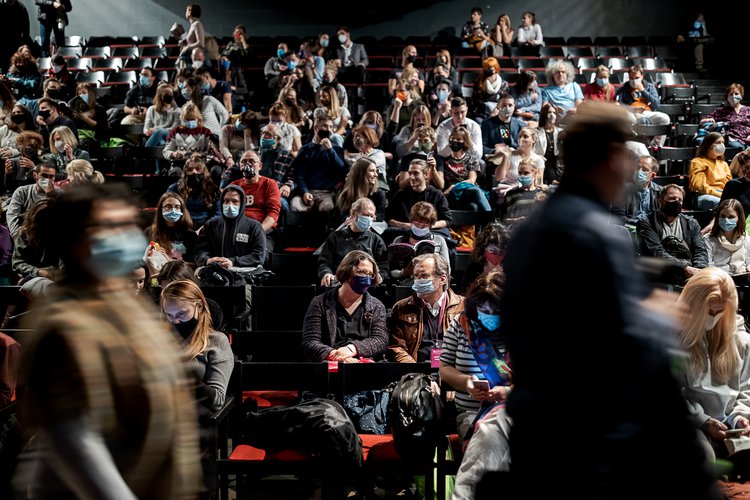
64 films were screened in the film program, which comprised of three competition sections, the International Competition, the Student and Debut Competition and the Hungarian Competition, four thematic sections, Parrhesia: The Moment of Truth, Anthropocene, Dive Into the Mind, Viewfinder, the Student Verzió, and special screenings such as the Festival Crossroads, the Jury’s Highlight, the Focus on Afghanistan, and selected films by the students in the DokMA documentary film director Master’s program at SZFE. Joining Blinken OSA’s Parrhesia exhibition, Verzió presented 7 documentaries in The Moment of Truth section. The films covered a number of topics, including stories from the Belarusian uprising to fearless young activists around the world and courageous journalists in India.
The accompanying programs included 37 Q&As, discussions and roundtables, 12 industry events, 12 Student Verzió screenings for high schoolers, 6 concerts, 2 exhibitions and several online available discussions, attended by 50 international and Hungarian guests. As part of the diverse program selection, three round tables were hosted in Blinken OSA on 13 November, Saturday. All of them are available on Verzió’s YouTube channel.
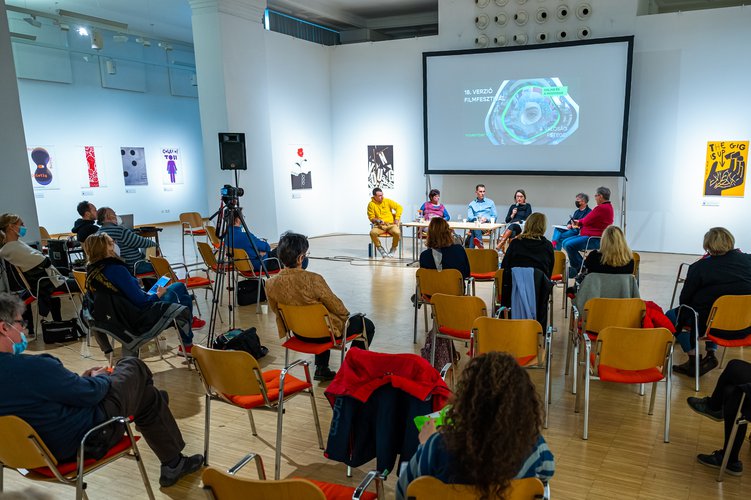
Screenings and extra programs were organized in Pécs, Szeged, Kecskemét, Debrecen and Szombathely simultaneously with the Budapest festival in cooperation with Szabad Terek, a country-wide network of independent organizations and community spaces.
Verzió’s cooperation with universities, called Univerzió, continued in 2021. The alternative film poster exhibition in cooperation with the Budapest Metropolitan University (METU) that had in previous years opened in Empathy Café took place in Galeria Centralis at Blinken OSA. The exhibition is a collective work by the different departments of METU: Graphic Design MA students design the film posters and Design Culture BA students organize the opening event.
At the Faculty of Humanities of the Eötvös Loránd University (ELTE BTK), Media and Communication Studies BA students can pursue a course about Verzió where they discuss human rights film festivals. Film Studies MA students can also enroll in a course focusing on Verzió’s documentary films where they discuss the theory of documentary film. The students of both courses take part in the festival by moderating Q&As and writing film reviews and essays which are then published on the Verzió Blog. We also continued other education programs, for instance, Student Verzió, and screened 12 times to high school groups in Művész cinema during the festival.
The theatrical screenings ended on November 14; however the festival continued until November 21 with films to rent online on festival.verzio.org, available across Hungary – some of them worldwide. On 13 November, seven films were awarded by international jurors at the Award Ceremony in Toldi cinema. The awards of the 18th Verzió were once again designed by students at the Moholy-Nagy University of Arts and Design (MOME).
The 18thVerzió’s media partners were the largest independent news platforms: 24.hu, HVG.hu, 444.hu, telex.hu, wmn.hu, and among the new partners was the popular magazine ELLE. The press coverage counts more than 150 appearances including printed and online press, TV and radio interviews. Verzió was also covered in the international press about the film industry, for example on Film New Europe and Business Doc Europe.


Judit Izinger, Milos Pavlovic
The Vera and Donald Blinken Open Society Archives’ (Blinken OSA) Records and Information Management Services (RIMS) were established to preserve the institutional memory and history of the Open Society Foundations (OSF) network and to provide recordkeeping consultancy services to the Foundations’ institutions. As the official archives of Central European University (CEU), Blinken OSA also provides archival and records management services to CEU’s administrative offices, academic departments, research centers, and academic support units, as well as preserving the University’s records with historical value.
Among OSF’s hub offices, Blinken OSA’s RIM Services focused primarily on managing the Open Society Institute–Budapest’s records until that office was forced out of Hungary. For OSF, although not considered strictly a records and information management task, the RIMS team shifted its focus to the collection and preservation of OSF’s historically valuable documents. Nevertheless, the global network with its geographically dispersed foundations and offices constitutes a real challenge for the understaffed RIMS team.
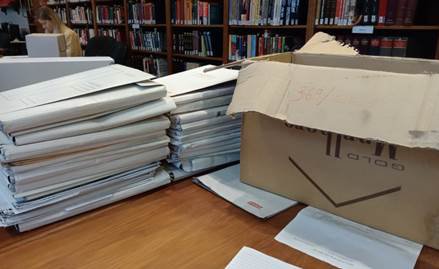
In 2021, the two-person team continued to maintain three on-site records centers and one off-site storage facility. Over the year, more than one hundred containers (boxes/binders) of paper-based records were transferred from CEU programs/departments/offices to the on-site records centers, and around 150 containers/files were retrieved in paper or electronic format by OSF and CEU staff (including documents digitized for retrieval purposes). In addition, nearly one and a half thousand electronic files were transferred to the Archives for long-term preservation.
Due to "Lex-CEU", Hungary’s amended higher education law, CEU’s degree programs were forced to leave Hungary and move to Vienna in 2020. The relocation of the academic departments and several administrative units added new aspects to the challenges facing the RIMS team. Due to the nature of records management, there are tasks that require in-person meetings and the physical presence of records managers at the CEU unit’s work area. Therefore, in order to perform specific tasks more effectively, the records managers plan to visit the Vienna campus more frequently in the future.
In 2021, the RIMS team continued to conduct online and onsite meetings and consultation sessions with CEU units that remained on the Budapest campus. These discussions helped identify records created, received, and maintained by the units. Based on the information acquired, the RIMS team was able to provide CEU colleagues with unit-tailored advice on arranging and preparing their records for archiving.
As a consequence of the relocation of a significant part of the university to Vienna and the sale of the University’s Oktober street building in Budapest – with its underground three-storey archival storage equipped with a professional mobile shelving system built by the University in the late 1990s – new records center areas and archival storage facilities have to be established on both campuses. In 2021, RIMS team members, along with other Blinken OSA staff, spent a considerable amount of time working closely with the Campus Redevelopment Office (CREO) and an international architect company as well as with the Budapest Facilities Management staff on planning new storage areas and giving advice on special archival and record storage requirements, such as temperature, humidity, safety, and fire protection requirements. In order to protect archived materials from various hazards and to guarantee long-term preservation of the Archives’ holdings, Blinken OSA staff aims to ensure a suitable storage environment for the coming decades.
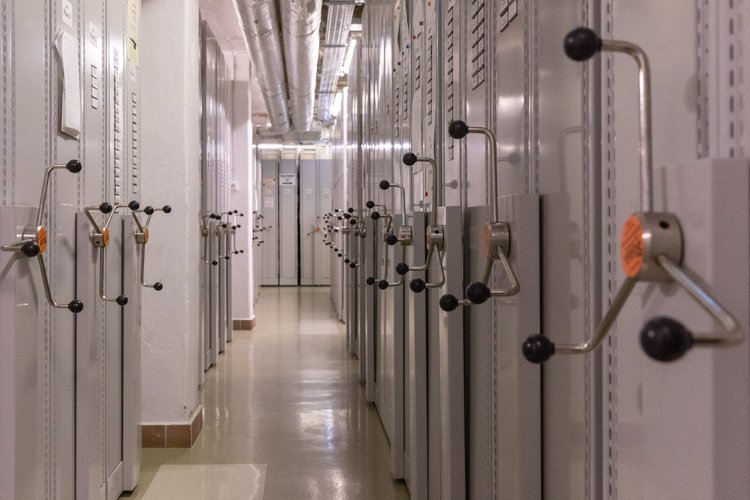
As indicated above, Blinken OSA's RIM Services are increasingly involved in the afterlife of the records it takes care of. The long-term preservation of documents of historical value produced by the OSF network and CEU is an integral part of the work of the RIM Services.
In 2021, the RIMS team supervised archivists and assistant archivists in selecting and processing the Soros Foundation–Hungary collection. In the fall of 2021, four pallets of documents (80 crates) were processed and described. As a result of this pre-processing assignment, the documents were reboxed into 299 archival boxes containing 8763 folders in all, while their contents were registered and described in a spreadsheet. In addition, the RIMS team processed OSF program materials, such as records of the Arts and Culture Program (ACP) and of the Education Support Program (ESP). Regarding CEU’s long-term and permanent records, the RIMS team regularly archives students’ academic records, which are to be kept for 80 years as required by law. In 2021, RIMS staff archived several academic departments’ course syllabi received from the CEU Library.
Another of the RIMS team’s major CEU-related archival projects was their contribution to Blinken OSA’s audiovisual units work by inventorying, arranging, identifying and describing CEU’s paper photographs and photo negatives. 701 containers (envelopes, sheet protectors) of paper photos were registered and their – rather incomplete – heritage metadata entered on container level into a spreadsheet. As for the photo negatives, after the RIMS team cut and placed the 312 negative rolls into special negative sleeves, the audiovisual archivists digitized them. As a result of some very time-consuming but exciting research, the RIMS team managed to create sufficient bilingual metadata (titles, descriptions) for the first half of this collection. After finishing the container (negative roll) level description, it will be a challenging but rewarding project to describe the images on frame/item level as well.
Besides supervising interns and assistant archivists in their processing of records, as well as providing records management-related and archival consultations to affiliated organizations – for instance to the recordkeeping staff of the Office of the High Representatives (OHR) in Bosnia and Herzegovina in 2021 – RIMS staff also contribute to archival and records management courses and trainings. In 2021, the team participated in Blinken OSA’s archival training program organized for the Srebrenica-Potocari Memorial Center.
As part of its professional development, the RIMS team participated in ARMA InfoCon2021, a conference for records and information management and information governance professionals to learn new technological solutions and best practices. The team aims to ensure that CEU's electronic records are managed according to professional standards and will therefore investigate whether Microsoft 365's records management feature could be an appropriate solution for the University.


Nóra Bertalan
The year was ravaged by the Covid-19 pandemic and its consequences, thus huge efforts were made by colleagues to organize public events that could be either online or onsite with precautions, as the pandemic was slowly disappearing. This was the only year in the history of our Galeria Centralis that saw no major exhibitions organized by colleagues at the archives, except in the online space (although we have had chamber exhibitions).
The first public event was Re-Verzio : the best films of the 17thVerzió film festival, held online in 2020, were available for limited-time streaming as every spring, during which some of the best films from the Verzió Festival would be rescreened at Blinken OSA. In 2021, due to the pandemic, the films were made available online on the Verzió website from February 15 through April 30, 2021, in the framework of Re:Verzió.
What followed was Szabolcs Kiss Pál’s Documentary Radio Play titled Blood/Witness that was broadcasted on Tilos Rádió January 10, 2021, from 12.30–1.30 p.m. It was an accompanying event to the exhibition produced by the Vera and Donald Blinken Open Society Archives as part of the exhibition From Harvest to Harvest – Hungarian Calvary 1918–1919, supported by Zsidó Kultúra 2028, in January, 2021.
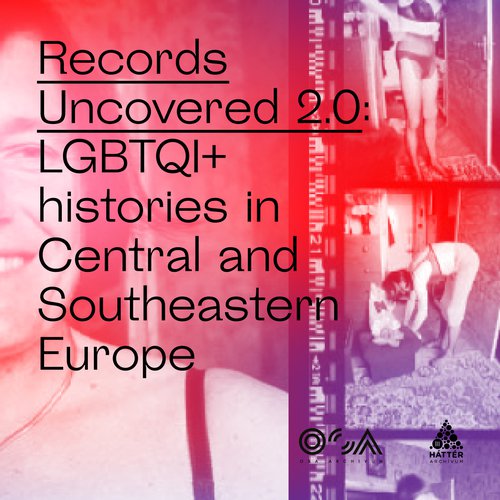
In February a joint project of Blinken OSA and the Háttér Archives and Library opened in the form of an online exhibition due to the pandemic. Titled Records Uncovered: Gay and Lesbian Histories in Central and Southeastern Europe, 1945–1999, the exhibition presents the divergences and commonalities among gay and lesbian movements in Central and Southeastern Europe in the second half of the last century. It was also an “exhibition in progress”, a collaborative effort in the form of a year-long LGBTQI+ history project, in which the Blinken OSA and Háttér invited contributions of relevant materials by members of the LGBTQI+ communities in Central and South-Eastern Europe. The exhibition was curated by Perica Jovchevski, Central European University/Blinken OSA and Péter Hanzli, Háttér Archive and Library
The next online exhibition was another important collaboration spanning the years with the OFF-Biennale Budapest. The exhibition titled ORDER AND DREAMS (The context of the poem “A Breath of Air”) was organized by Blinken OSA and the Off Biennale Budapest and opened online in April. Curated by Katalin Székely, the exhibition was part of the third edition of the OFF-Biennale Budapest, INHALE!.
The third edition of OFF-Biennale Budapest, INHALE!, took the seminal political poem “A Breath of Air!” by 20th-century Hungarian poet Attila József as its starting point. The poem was written in November 1935. Apparently, it was a time of peace and plenty: Europe—and Hungary—had overcome the crisis of the Great Depression; order had been restored. But what kind of order was it that the poet “didn’t dream of”? The research and exhibition project presented the political and social context of the poem through archival materials, while contemporary artworks offered its possible 21st-century reading.
The third online exhibition inJune, 2021 titled Hidden layers. Archives and data management was also the result of a collaboration but this time with the Moholy-Nagy University of Art and Design and its students. The archives had earlier set up a teaching cooperation with the Media Design program at the University, the MOME students of the teaching program put together an online exhibition based on the projects they had produced during the course.
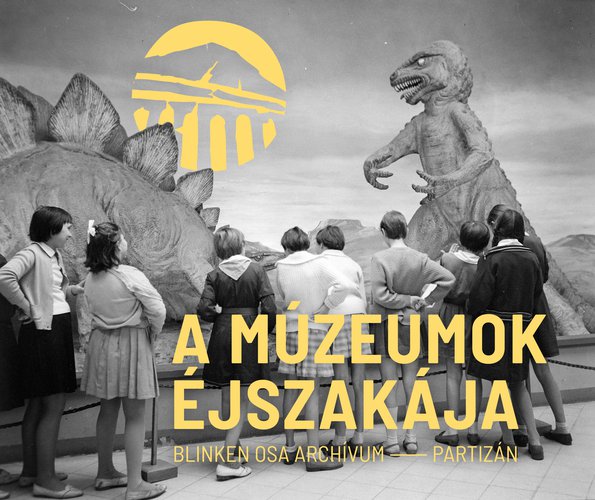
There is no summer without the Night of Museums and Blinken OSA usually takes an active part in it. This year the Archives, together with Partizán, addressed the night of the museums: the current conditions of public collections in Hungary. On June 26, in a temporary studio set up in the Blinken OSA, the YouTube Channel Partizán welcomed public collection workers and experts to talk about the current condition of museums, archives, and libraries in Hungary. During the past decade, the Blinken OSA has become a safe haven for endangered collections. Visitors to the Archives could attend house tours focusing on the endangered collections preserved here.
The summer of 2021 gave us the chance to hold a film screening event on-site and online as well, after the Covid -19 pandemic began to fade. The film titled Game On - queer disruptions in sport was screened on the occasion of the 26th Budapest PrideVerzió brought our audiences the latest documentary by Mari Takács.
One of the flagship programs over the years was the launch of Budapest100 with KÉK Contemporary Architecture Center in 2011; more than a decade later the program is still famous, run by KÉK and still supported by Blinken OSA. In 2021 due to the pandemic the event was postponed and held in September titled Budapest100 – Redesign.
Blinken OSA has a long-standing working relationship with the Swedish Embassy, and in September we organized a visit and seminar by Ingrid Carlberg at the Archives. We hosted the Swedish Academy member, prominent writer and former investigative journalist Ingrid Carlberg, who was staying in Budapest at the invitation of the Swedish Embassy with the support of the Free SZFE Association.
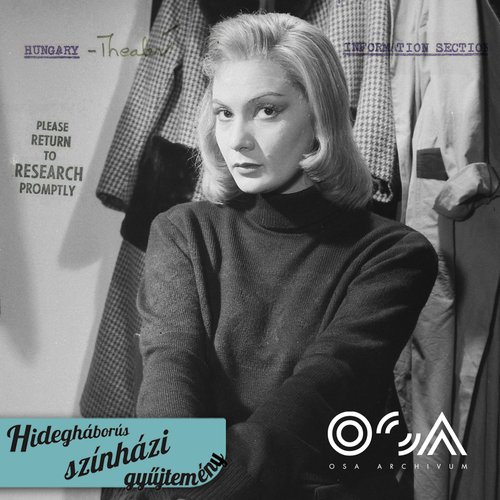
In October we celebrated the launch of a new curated collection in the form of a public discussion titled Shakespearevsky – Open Discussion on the Cold War Theater Collection.
November was “VERZIÓ time” and we hosted an exhibition titled Alternative Film Poster Exhibition.
The 18th VERZIÓ International Human Rights Documentary Film Festival, founded by Blinken OSA, has its regular spin-off event, thus The alternative film poster exhibition, was organized at the Archives.
For the fourth year, the Budapest Metropolitan University’s (METU) graphic design MA students exhibit their works in cooperation with Verzió Film Festival. The group exhibition is part of the festival's UniVerzió initiative, which invites university students to dive into the world of documentary film through both practical and theoretical exercises during the fall semester.


Katalin Dobó
This year was particularly rich in new library donations. In contrast to the previous year, when precious books and rare journals were "evacuated" to us by endangered institutions, 2021 stands out by remarkable individual donations and family legacies added to our collection. These donations were all preceded by preliminary surveys, detailed consultations, and a careful selection of documents.
The library of Hungarian historian György Litván, and his family legacy of books and documents accumulated over generations, was transferred to us in two installments. A blog entry dedicated to the Litván family and to their personal papers and library explains why this collection is so valuable: beyond the intrinsic value of the documents themselves, it also offers us insight into the ups and downs in the life of an outstanding bourgeois family in the past century, while hundreds of books signed for the Litván family map their professional and personal networks.
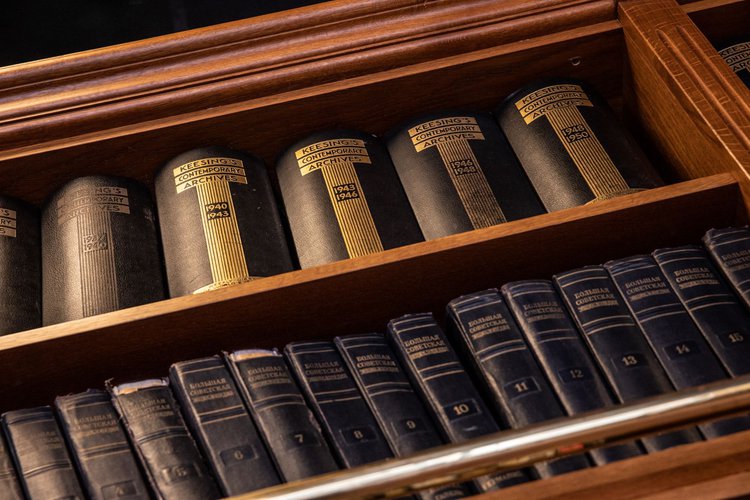
In Summer 2021 we were approached by Rachel Shub, who generously offered Blinken OSA a special book collection assembled by her father, Anatole Shub, including monographs, memoirs, rare and émigré publications. Anatole Shub was an award-winning journalist for the Washington Post. Son of David Shub (an early critical biographer of Lenin), and brother of Boris Shub (journalist, writer on Soviet affairs, and one of the founders of Radio Liberty), he began covering Eastern Europe in the 1950s, including the Prague Spring and invasion of Czechoslovakia in 1968 as well as the Russian dissident movements and the political role of the Soviet army, which led to his being expelled from the Moscow bureau in 1969. He devoted his career to analyzing, studying, and writing about Eastern Europe and the Soviet Union; this included several years in the 1970s at the RFE/RL offices in Munich (as news director), and its oversight body, the Board for International Broadcasting in Washington.
The third major donation worth highlighting is The Roger Griffin ComFas Collection. The British professor of modern history and political theorist at Oxford Brookes University, Roger Griffin is the co-founder of ComFas, the International Association for the Comparative Study of Fascism, directed by CEU professor Constantin Iordachi. The monographs and textbooks in this comprehensive collection are invaluable resources for the study of fascism, one of the most intriguing and debated radical political phenomena of the twentieth century.
The donation of Alexei Miller ( relating to the Balkan wars; the books of CEU pro-rector, Zsolt Enyedi covering comparative politics, and the English, Hungarian, and French monographs relating to international relations and media science by sociologist Miklós Sükösd, professor at the University of Copenhagen, were, too, added to our Library catalog.
It is a great honor to us, that the outstanding Hungarian sociologist, academic, and researcher of poverty, exclusion, and social structures, Zsuzsa Ferge, donates her book collection to the library of OSA Archivum.
We made good progress with our Budapest Week project. Four volumes of the first Hungarian English language weekly are now digitized, and as an unexpected addition to the printed newspaper, 42 boxes of paper photos from the photo archives of the Budapest Week were also donated to the library. These represent the turbulent but promising years after the regime change in Hungary, thus serving as rich documentation for the researchers of that era.
For the Night of Museums, a comprehensive Timeline (in Hungarian) was created about the past 11 years of Hungarian public collections and cultural institutions; it was used extensively for public discussions and interviews.


Csaba Szilágyi / Iván Székely
Following the trend established during Blinken OSA’s 28 years of existence, in the year 2021 several important partnerships and cooperation projects have been developed with already existing and new partner institutions alike.
A special group of partner institutions are operating in the successor states of the former Yugoslavia striving to preserve the memory and heritage of genocide, crimes against humanity, and grave violations of human rights committed during the Yugoslav wars of the 1990s, contributing to individual and societal reconciliation. Perhaps the most significant of these is the Srebrenica Memorial Center in Potočari, Bosnia and Herzegovina, of which Blinken OSA is an important partner. Csaba Szilágyi, Chief Archivist of Blinken OSA, has been acting as a pro bono archives consultant for the Center, and provided essential assistance to the planning and establishing of the Center’s archive.
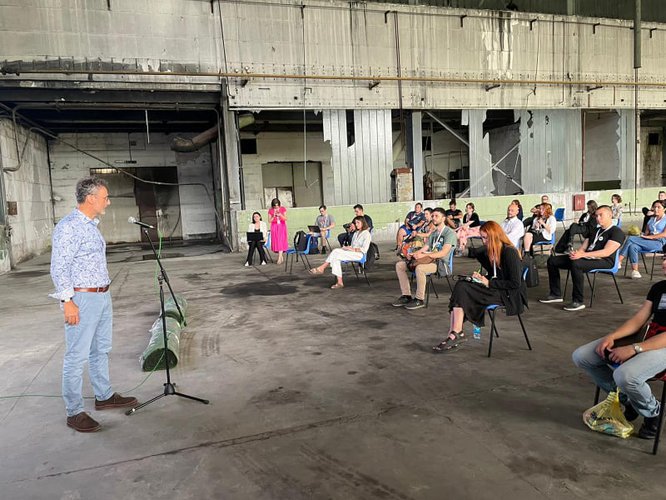
On June 9, 2021, the International Archives Day, a week-long archival training program for the new archive began, designed and carried out by the professional staff of Blinken OSA, who acted as volunteer instructors during the online training. The training covered a wide range of topics that serve as the base for professional archival operation.
On July 9, 2021, the new archive was opened in the presence of an international audience, including Szilágyi who gave a speech at the opening ceremony and wrote a powerful blog post about the event. He also announced that Blinken OSA had donated to the new archives 400 videotapes of news programs from state-run and private TV stations in Bosnia and Herzegovina, covering the first post-Dayton years (1996–1999), as well as close to 8,000 digitized pages of David Rohde’s research materials. Rohde was the first Western journalist who reported about the mass graves in the UN “safe area” and was awarded the Pulitzer Prize for his series of articles covering the genocide. The background materials he compiled throughout this work is preserved, cataloged, and digitized at Blinken OSA.
A copy of the digitized version of Rohde’s research collection on the Srebrenica genocide was also transferred to the History Museum of Bosnia and Herzegovina in Sarajevo, based on a trilateral agreement between David Rohde, Blinken OSA, and the Museum. The Museum will incorporate the donated materials in its permanent collections and make them available for further research.
In November, a professional study trip, organized by the PAX peace organization with the participation of Bosnian colleagues and Blinken OSA staff, was conducted to Dutch memory institutions: the Netherlands Institute for Military History (The Hague), the International Institute for Social History (Amsterdam), as well as Kamp Amersfort, and Kamp Westerbork.
In 2019 Blinken OSA returned the originals of English-language letters children from Sarajevo had written in 1993 to their peers in the United States as part of the Pen Pals for Peace Program initiated by George Soros, that were preserved and digitized in Blinken OSA, to the War Childhood Museum, Sarajevo. In 2021, as a continuation of the cooperation, Blinken OSA prepared a study and recommendations for the WCM to improve preservation and storage conditions of archival and museum collections.
Archival documents from the collection of Radio Free Europe/Radio Liberty Research Institute held at Blinken OSA contributed to the documented evidence published in October 2021 within the new interactive public history project on the 1991 August Coup in Leningrad and Moscow. The online portal Leningrad. August. Freedom was launched for the 30th anniversary of the 1991 Soviet coup d’état attempt. Citing documents from Blinken OSA is the first step in a cooperation between the Archives and the St. Petersburg-based research and information center Iofe Foundation on the history of dissent in Leningrad.
Besides donating documents and providing archival expertise, Blinken OSA also hosts study trips from other institutions. Traditionally every year, Blinken OSA hosts a small group of students from Columbia University and West Point Military Academy, headed by their academic tutor and professor Victoria Phillips of the London School of Economics. Following their research week in Blinken OSA, students write their papers and present their findings at the Cold War conference at Corvinus University.
Following the 18th Verzió International Human Rights Film Festival, organized with online and physical screenings that attracted around 20,000 viewers, a new international network was launched, and Verzió was among the founding partners. The members of the new network Places to B are Verzió, Fipadoc International Documentary Film Festival (Biarritz, France), and Biografilm festival (Bologna, Italy). Verzió was founded by staff members of Blinken OSA in 2004 and since 2005 it is operating within the Verzió Film Foundation which provides the organizational background of the festival. Places to B is an open network that invites other festivals willing to commit to transparency and cooperation for producing vivid, diverse, and eco-friendly cultural activities.
From among Hungarian partnerships and projects, the cooperation between Blinken OSA and the news portal 444.hu, one of the leading independent news websites in Hungary, can be regarded as the most important one. The cooperation started in early 2021: Blinken OSA launched a blog series at 444.hu titled “Forrás.” [Boiling Point], consisting of posts written by the Blinken OSA staff, revolving around archival sources and their archival, historical, and contemporary context. As 444.hu is in Hungarian, English translations of the posts are published at the blog section of Blinken OSA’s website. During the year, 21 illustrated posts with rich collections of links and references had been published on this platform.
On the 2021 Night of the Museums, Blinken OSA addressed the current condition of public collections in Hungary. In 2020, we launched a timeline to capture the crucial developments that affect Hungarian museums; in 2021, it was our bitter duty to update this collection. The timeline uncovers how some institutions in Hungary have access to extraordinary resources and opportunities, while others lost their autonomy, their places of residence, their collections; at the same time, their intimidated workers were forced into vulnerable situations. To investigate these conditions, Blinken OSA partnered with the online political and cultural talk show Partizán, and realized a series of panel discussions on the Night of the Museums, inviting the president of the union of public collection and public education workers, the former leader of the preservation department of the Hungarian National Archives, current and former museum workers, representatives of archives and research centers thwarted by the government, and many others. The entire program is available (in Hungarian) on the Partizán YouTube Channel.
On the occasion of the above event, Blinken OSA officially endorsed the guiding principles for Safe Havens for Archives at Risk and translated them into Hungarian. The Safe Havens for Archives at Risk, an international network, was initiated to promote safe haven arrangements, and to facilitate archives at risk find a potential, suitable hosting institution. Blinken OSA, which served as an invited expert in the preliminary phase of the development process. This initiative assists, among others, archival institutions in Syria, Guatemala, South Africa, or Colombia; yet, the question surfaced, whether to what extent the risks listed in the guiding principles are unthinkable in Central Europe?
The Hungarian Desk of Radio Free Europe/Radio Liberty, which was relaunched in the form of a multimedia website in 2020, established professional cooperation with Blinken OSA, the archive of the Research Institute of RFE/RL. In several cases the Hungarian Desk used our historical documents, and we also called the editors’ attention to documents relating to approaching anniversaries or actual political events. On the sixtieth anniversary of the first manned spaceflight in history, Yuri Gagarin’s flight in 1961, Tibor Vovesz, Director of the new Hungarian Desk of RFE/RL, presented this event as a milestone in the Space Race, a Cold War front line between the US and the Soviet Union, on the basis of an RFE/RL Background Report preserved at the Blinken OSA.
Finally, but not less importantly, Blinken OSA also established archival cooperation with other units of the Central European University, of which Blinken OSA is an organizational unit. Based on a long-term cooperation agreement, Blinken OSA became the official archive of the research results of the students, researchers, and faculty of the Cultural Heritage Studies Program, hosted by the Department of Medieval Studies. Faculty and students at CHSP deal with both material and intangible cultural heritage in their research. In the first phase of this project, the collection of Intangible Cultural Heritage data is made publicly available, and the first collections were published online in 2021, as part of Blinken OSA’s Digital Repository.


Iván Székely / Csaba Szilágyi
In 2021, the pandemic situation and the fact that CEU was fully operating in Vienna, had a significant impact on our educational activities. Since the students were studying in the Vienna campus, and Blinken OSA was operating in Budapest, in-person teaching and learning opportunities were limited, both for professors and students. Besides commuting between the two cities, online and hybrid solutions were applied, with special regard to the fact that some students had visa problems and thus could not enter Austria in time.
The most significant educational achievement of the year was History in Public Spaces (HIPS), an Erasmus Mundus Joint Masters Degree program, a chapter of which was hosted, from among five renowned international educational organizations, by the Department of History at CEU. Blinken OSA offered a course and an internship, which constituted and integral part of this program, for those students who participated in HIPS in-person in Budapest or remotely. Our contribution consisted of 18 classes and workshops held at Blinken OSA in January and February 2021.
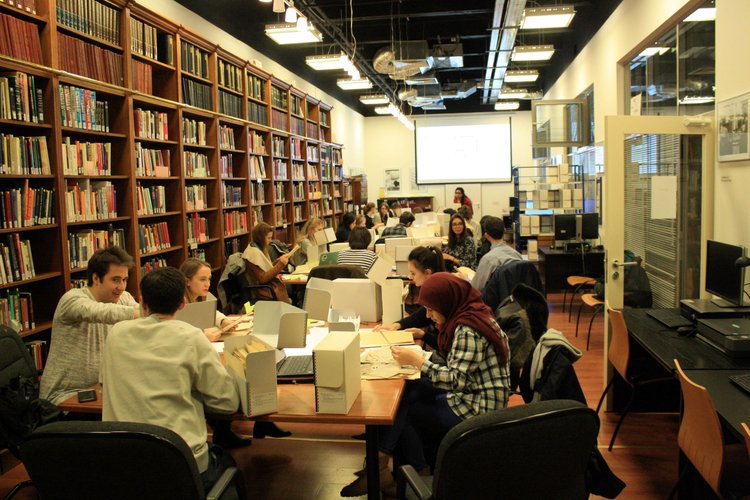
The concept of this complex course and internship was worked out by István Rév and Ioana Macrea-Toma, and several colleagues from Blinken OSA’s staff, including Csaba Szilágyi, Oksana Sarkisova, András Mink, Katalin Székely, Zsuzsa Zádori, Judit Hegedüs, Miklós Zsámboki, and Iván Székely, actively contributed to presenting certain topics. The internship included practical demonstrations of video production tools, provided by Kálmán Tarr, despite the fact that in the online environment the possibilities were rather limited. Students were required to conceptualize their own individual research projects within the broader theme of HIPS, with an emphasis on archives and recorded memory, and realize the projects within the limits of the circumstances. The final project works were presented by the students at the end of their stay at Blinken OSA.
The two-credit course History in the Visual Mode: Methods and Practices of Documentary Storytelling was taught by Oksana Sarkisova, together with CEU’s Media and Visual Education Specialist Jeremy Braverman. The course focused on the representation of contested historical events in documentary cinema, combining theoretical and practical approaches. It introduced students to the basics of analyzing and producing moving images that use historical arguments and explore relationship between memory and public spaces. The theoretical part of the course surveyed classical and experimental documentary films, and addressed mechanisms of constructing historical narratives by visual means. In the practical component of the course, students learned the basics of camera work and editing, and did group exercises to develop their visual skills.
The 20th, jubilee edition of the course Archives, Evidence and Human Rights, taught by Iván Székely, Csaba Szilágyi, and András Mink, was due in the 2021/2022 academic year. However, because of the limited possibilities in the schedule of the CEU departments concerned, the actual holding of the course shifted to early 2022, thus we will report on this course in our 2022 Annual Report.